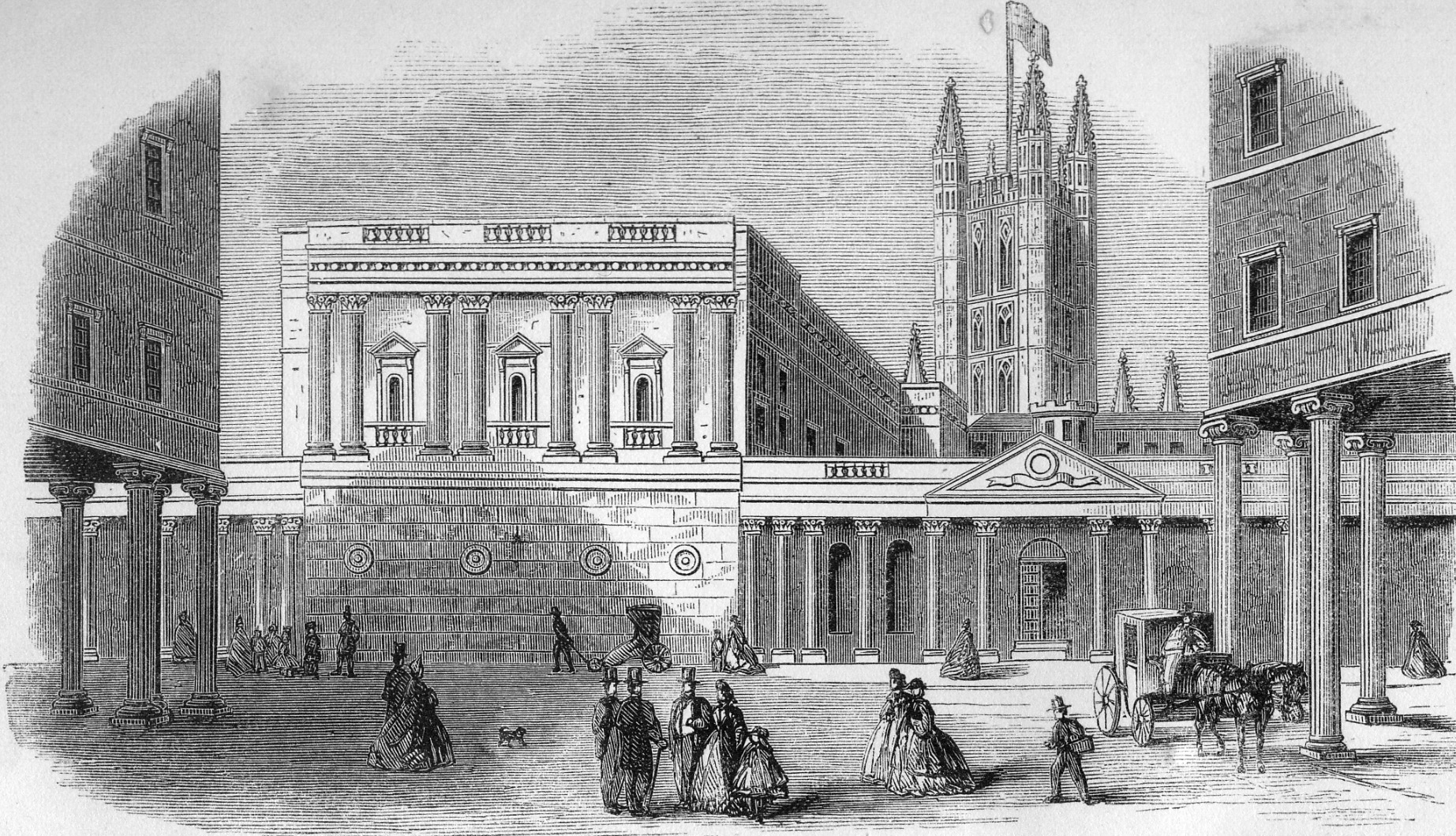 |
| Bath's Pump Room (the Abbey is in the background): the place to go to see and be seen. |
Bath was still popular; it just didn't have the caché it used to.
Austen was well-aware of Bath's reputation and uses it to effect in her writing. The Bath of Persuasion is a playground for elderly gentry, including gentlemen like Sir Walter who can't quite afford London (Mr. Shepherd is correctly appalled at the idea of sending Sir Walter off to live in London, where the baronet would put himself into more and more debt just to keep up with the "Joneses").
From a literary standpoint, Bath is an excellent setting to show-case Elizabeth and Sir Walter's personalities. First, in Bath, father and daughter are big fish or, at least, bigger fish than they would be in London. Also, in Bath, father and daughter are able to exercise their pointless snobbery to the nth degree.
Prior to Austen's time period, private parties were considered a big no-no in Bath. People like Beau Nash went out of their way to create a society that was surprisingly egalitarian (for the time period) while also surprisingly rigid in terms of social expectations. Going to Bath was rather like going to a really assertive summer camp where you would be expected to attend dances and concerts while getting along just swimmingly with your neighbors.
But during Austen's time period, this rigid community spirit was waning (for one thing, Beau Nash was dead). Consequently, visitors like Elizabeth and Sir Walter are able to do whatever they please.
And what they please is exactly what you would expect from people like them:
Cocktail parties.
What Elizabeth and Sir Walter enjoy is walking around the equivalent of a ritzy hotel lobby (the Pump Room), then holding private parties where conversation is the kind of stuff you find on Twitter.
It is no surprise that Anne (and Austen) prefer the theater to this type of "entertainment." But for egoists like Elizabeth and Sir Walter nothing could be better than seeing, being seen, and showing off.
One particular morning, Elizabeth went off to meet friends at the Pump Room; Sir Walter strolled into Bath’s center with Sir Basil Morley. Penelope could have wheedled inclusion in the first instance, not in the second. She opted for coy withdrawal and gave herself an hour of pleasurable freedom. She walked to Walcot Church and then to Portland Place to study the architecture.
She returned to Camden Place before Elizabeth and Sir Walter.
“A man called,” the butler told her. “He left a card and note.”
Penelope knew better than to ask for either. The butler had no loyalty to Sir Walter, but he had no loyalty to Penelope either. Sir Walter would be very testy if he thought Penelope had seen his messages before him.
“Sir Walter should return soon,” she said briskly and went into the elegant drawing room with its long view over the road’s iron-rails towards Bath’s eastern hills.
Daughter and father returned full of self-satisfaction. Their meetings had bolstered their conceit—if such bolstering was needed.
As Sir Walter entered, the butler handed over the caller’s note and card. Sir Walter read them, gaped fish-like, then handed both to Elizabeth. He seemed uncertain what emotion to put on display.
Elizabeth said slowly, “William Elliot called.”
The heir—who had run away from marrying Elizabeth twelve years before, though Elizabeth naturally didn’t describe the incident that way. She’d told Penelope that Mr. Elliot “was not quite a gentleman.”
The not-quite-a-gentleman had called on his baronet cousin.
Elizabeth read the note aloud: “Dear cousin, if I may so name you: I pray you will not censure my presumption in approaching you. Learning of your visit to Bath from my good friend Colonel Wallis, I hoped to end our too long separation. I dare presume that I have not lost your good opinion though your silence in recent years indicates I may have inadvertently fallen from favor. When I return to Bath, I venture to trust I will be accepted into your company.”
Clever, Penelope thought, her mouth quirking at such effusiveness mingled with no real apology or explanation for the “long separation.”
But why should Mr. William Elliot, Esq. renew the relationship at all?
Money, Penelope guessed.
“He has learned the deference due our name,” said Sir Walter. “Should we receive him?”
“He might not call,” Elizabeth said, dropping the note and card. Later to Penelope, she added, “He was a fickle young man.”
Mr. Elliot’s note impressed father more than daughter. Sir Walter “accidentally” encountered Mr. Elliot’s great friend Colonel Wallis on Milsom Street. “He was picking up a hat for his wife, a very pretty woman, I hear, and Colonel Wallis is a well-looking man.”
Colonel Wallis knew Mr. Elliot well; he even knew about Mr. Elliot’s disastrous first marriage.
“She didn’t come from a family of status,” Sir Walter said. “But she was quite accomplished. A handsome woman.”
Elizabeth’s lips thinned. Penelope could read her thoughts: Elizabeth at nineteen had been handsome, accomplished, and suitable.
Sir Walter continued, “She pursued him. With her riches.”
Elizabeth was handsome, accomplished, and suitable, but she would never pursue anyone. Her lips relaxed and she said graciously, “Young men are easily swayed.”
Penelope forced herself not to roll her eyes. At this rate, father and daughter would talk the last twelve years into oblivion. And how could they not suspect Colonel Wallis’s account? He would hardly pass on negative information about a close friend.
Still, Penelope wasn’t opposed to Mr. Elliot calling. He might even prove a respite from his relatives.
